Index relies entirely on the support of donors and readers to do its work.
Help us keep amplifying censored voices today.
The anti-terror charges against reporters for Vice News in Turkey are not isolated. In recent years, a number of countries have used broad anti-terror laws to restrict the freedom of the press.
Turkey
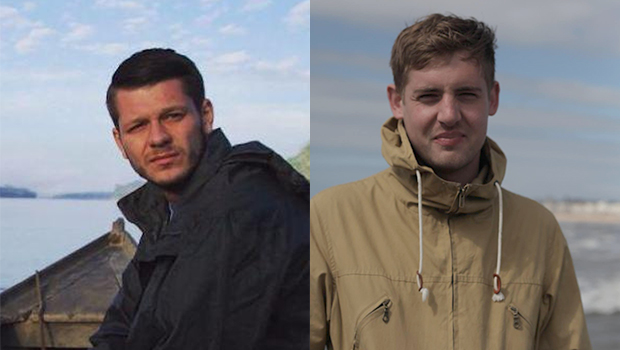
British journalists Jake Hanrahan, left, and Philip Pendlebury and Iraqi translator and journalist Mohammed Ismael Rasool were filming clashes between pro-Kurdish youths and security forces, according to Vice. (Photos: Vice News)
Two British journalists and a local fixer working for Vice News were charged on Monday 31 August in Turkey with “working on behalf of a terrorist organisation”. They will remain in detention until their trial, the date of which has not yet been announced.
The journalists Jake Hanrahan, Philip Pendlebury and Iraqi translator and journalist Mohammed Ismael Rasool were filming clashes between security forces and youth members of the Kurdistan Workers’ Party (PKK) in the south-eastern city of Diyarbakir on Thursday when they were arrested.
Turkey’s broad definition of terrorism means that any journalist reporting on PKK activities or Kurdish rights can be charged with the offence of making “terrorist propaganda” and jailed.
Index on Censorship Chief Executive Jodie Ginsberg said: “Coming just days after the unjust sentencing of three Al Jazeera journalists in Egypt, these latest detentions of journalists simply for doing their jobs underlines the way in which governments everywhere can use terror legislation to prevent the media from operating.”
Egypt
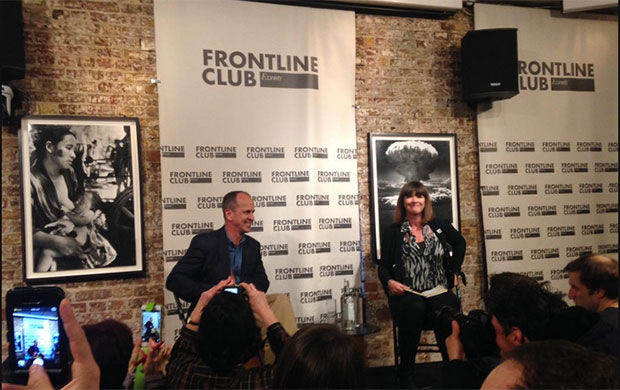
Peter Greste spoke to a Frontline Club audience about his arrest and detention in Egypt. (Photo: Milana Knezevic / Index on Censorship)
Egypt remains a cause for concern when it comes to press freedom: on 29 August 2015 Al Jazeera journalists Mohamed Fahmy, Peter Greste and Baher Mohamed were sentenced to three years in prison. The journalists were found guilty of of “broadcasting false information” and “aiding a terrorist organisation” – a reference to the Muslim Brotherhood.
The sentencing came just weeks after President Abdel Fattah el-Sisi’s government passed an anti-terror law setting a fine of up to 500,000 Egyptian pounds (£41,600) for journalists who stray from government statements or spread “false” reports on attacks or security operations against armed fighters.
Jordan
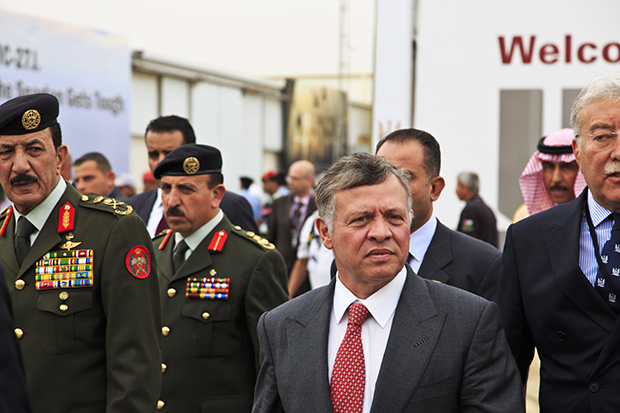
Abdullah II of Jordan at a conference in Amman in 2013. Ahmad A Atwah / Shutterstock.com
Jordan introduced a new “anti-terror” law in 2006 prohibiting, among other things, the engagement in “acts that expose the kingdom to risk of hostile acts, disturb its relations with a foreign state, or expose Jordanians to acts of retaliation against them or their money”. The charge carries a prison sentence of three to 20 years. The law was amended in 2014 to , broaden the definition of terrorism.
Interpretation of the law has been varied. According to the Committee to Protect Journalists (CPJ), in April 2015 a journalist was jailed for criticising the Saudi-led bombing of Houthi forces in Yemen. Another journalist was detained in July 2015 for breaking a recent ban on coverage of a terror plot. Earlier in 2015, an activist who criticised the royal family’s support of Charlie Hebdo on Facebook was sentenced to five months in jail under the anti-terror law.
Tunisia
One month after June’s terrorist attack on Sousse beach killing 38 tourists, for which ISIS claimed responsibility, Tunisia approved new anti-terror legislation.
Under the legislation, website editor Nour Edine Mbarki was charged in connection with publishing a photograph of a car that purportedly transported a gunman behind the beach attack. According to the CPJ, he was charged under Article 18 of the law with “complicity in a terrorist attack and facilitating the escape of terrorists,” which carries a prison term of between five and 12 years. He is currently awaiting a trial date.
Human Rights Watch said the new anti-terror bill “would open the way to prosecuting political dissent as terrorism, give judges overly broad powers, and curtail lawyers’ ability to provide an effective defence”.
Pakistan
Rights groups have long criticised Pakistan’s notorious anti-blasphemy laws for their effect on freedom of expression in the country. But strengthened anti terror legislation is also impacting the way journalists operate in the country.
In June, three Pakistani journalists were charged under the Anti-Terrorism Act, reportedly for covering the activities of a dissident politician, according to the Pakistan Press Foundation. A year before, a TV anchor was also charged under the law.
One to watch: Kenya
Following two separate attacks by al-Shabab militants in December, Kenya’s President Uhuru Kenyatta signed into law a new security bill that could curtail press freedom. Under the new law, journalists could face up to three years in jail if their reports “undermine investigations or security operations relating to terrorism” – or even if they published images of “terror victims” without police permission.
This hasn’t come into play yet – in February, the Kenyan High Court threw out several clauses, including those that could impact media freedom. The government has said it would consider lodging an appeal.
This post was written by Emily Wight for Index on Censorship
This article was posted on 1 September 2015 at indexoncensorship.org
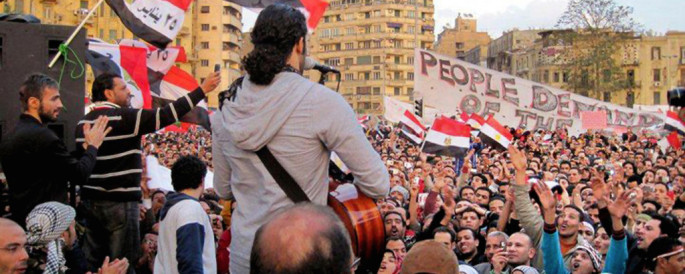
Photo – Ramy Essam, Tahrir Square – Festival 800
Join us in Lincoln for Festival 800, a celebration of the 800th anniversary of the sealing of the Magna Carta – a unique and powerful statement that began the world’s march to freedom and liberty.
Index on Censorship are delighted to be supporting Festival 800 and Freemuse who are staging a special day focused on musicians who have been banned from performing their work in their own countries. Events include:
13:30 – Listen to the Banned
Listen to the Banned is a compilation album that features the music of banned, censored and imprisoned artists from the Middle East, Africa and Asia. Project co-founders, music producer Deeyah Khan and Ole Reitov, executive director of Freemuse discuss the album’s origins and their wider work. Khan is a critically acclaimed composer, award-winning documentary film director and celebrated human rights activist. (£8)
16:00 – Talking With the Banned
Two international musicians who have faced censorship, “exiled bard of the Egyptian revolution” Ramy Essam and Basque artist Fermin Muguruza, join others including Deeyah Khan, editor of Index on Censorship magazine Rachael Jolley, and author and academic Martin Cloonan (chair) for a conversation about censorship. (£5)
19:30 – The Banned – Live and unplugged in concert.
A live gig featuring folk musician Ramy Essam who was catapulted to fame by the events of Tahrir Square; Lavon Volski, an icon of Belarusian rock music and Fermin Muguruza, who sings against the oppression that he feels Spain has over Basque Country. With Attila the Stockbroker as MC. (£10)
When: Saturday 5 September 2015, timings as above.
Where: Lincoln Performing Arts Centre, LN6 7TS (map)
Tickets: Special Index offer for whole day £15, quote INDEX when booking.

Peter Greste spoke to a Frontline Club audience about his arrest and detention in Egypt. (Photo: Milana Knezevic / Index on Censorship)
Peter Greste, the Al Jazeera journalist recently released after 400 days in Egyptian jail, met a packed room at London’s Frontline Club on Thursday, where he spoke about his time in jail, the campaign for his release and fellow journalists still imprisoned in Egypt. “An attack on journalism, an attack on freedom of speech, is an attack on the wider society,” he said.
“I remember that day well,” he said, recounting 29 December 2013, when a group of around eight men came to his Cairo hotel room and without explanation started searching it, before talking him away. While he was aware that the media was under some pressure in Egypt, the arrest came as a surprise. He felt as long as they stuck to their journalistic principles and didn’t push boundaries, they would be fine.
“There have been plenty of stories before where I’ve pushed boundaries, when I fully expected to get a knock on the door from the police, when I know I’ve upset governments,” he explained. But this time around, he hadn’t gone looking for difficult stories or made a conscious effort to try and challenge the government, so he “genuinely didn’t think it was going to be an issue.”
Greste was imprisoned together with Al Jazeera producer Baher Mohamed and Al Jazeera English’s Cairo bureau chief Mohamed Fahmy. He said they forced themselves to consider that they might be convicted, but never seriously believed it.
While there were “some very dark moments”, he insisted anger wasn’t his dominant emotion, believing that letting anger take hold of the situation would only hurt himself. They were broadly treated with respect in prison, and never physically threatened. “The problem is that in prison…what really matters is your own head, your own mind and how you cope with it.”
Egypt
Index has reported extensively on the situation confronting free expression in the country
Committee to Protect Journalists named Egypt as one of the world’s top 10 jailers of journalists in Dec 2014
Reporters Without Borders: World Press Freedom Index ranks the country as 159
Freedom House: Classifies Egypt as “not free”
Greste spoke of the importance of having a routine and some structure to his day, crediting seemingly simple things like meditation, exercise, studying and even cooking with helping him though the ordeal.
“The only way through is to set your horizon, to set a target date, to set something that’s manageable,” he said. “What you do is narrow your horizon, to the thing that you think you can cope with. Sometimes that was the end of next week, or it would be to the next visit. Sometimes it would be simply to the end of the day.”
Today, he doesn’t feel traumatised, and believes that we are all more capable of dealing with difficult situations than we think. And when discussing the conditions in prison, it was clear he had kept his humour. “The less said about the toilets the better,” he joked.
If his detention had been a surprise, so was his release. He had been expecting his brother for a visit, when he got the unexpected message to pack his bags — he was going home. Himself, Fahmy and Mohamed had discussed the possibility that one of them might be released before the others, and all agreed that if that were to happen, there would be no doubt that that person should go.
And yet, Greste said walking away and leaving Mohamed and others (Fahmy was receiving medical treatment at the time) behind was not easy. “And I still feel that and I still feel quite anguished about it.” His two colleagues have now been released on bail, with their retrial set to start on Monday.
Greste was also keen to remind us that while the three of them had been given the most media attention, many others had been caught up in the case — including three young students, a businessman and journalists sentenced in absentia.
“We can’t forget that sympathy tends to go with people who you identify with. As a European, as a white guy, it’s easier for white Europeans to identify with me than it is to identify with an Egyptian. I’m not suggesting for a second that that makes Baher’s case any less worthy. And in a way we need to bear that in mind, that because of that trend, it’s so easy to let local journalists slip through the cracks,” he also added. “It is the locals that get hit, and the freelancers in particular.”
He said he’ll continue to report, though he is not yet sure what form his work will take. He also hopes to continue to speak out for press freedom.
“One of the most extraordinary elements of this, and one that we are in danger of losing, if we do not make a conscious effort to hold on to, is the unity of purpose that emerged within the media community around our case. For some reason, the community right across the globe pulled together in a way that I think is absolutely unprecedented; we’ve never seen anything like this ever before,” he said.
“If we lose that sense of purpose, then we lose something that we have created of enormous value. I think its very difficult to maintain, particularly under the current circumstances, but I think it’s incumbent on everybody to recognise it, to make use of it, not just in our case but in the case of every journalist that’s been imprisoned.”
This article was posted on 20 February 2015 at indexoncensorship.org
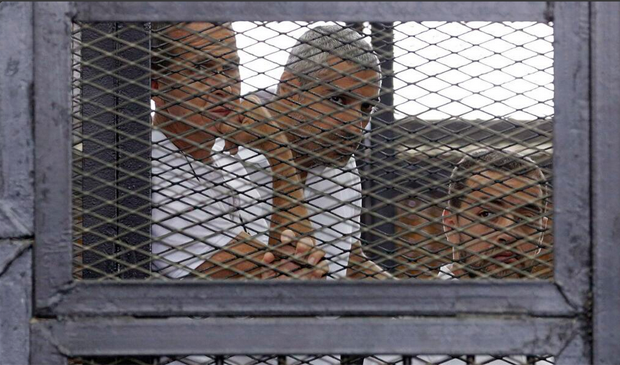
Peter Greste, Mohamed Fadel Fahmy and Baher Mohamed are three Al Jazeera journalists were among those sentenced to prison on terrorism charges.
As journalist Peter Greste returns to Australia to a hero’s welcome home, his two colleagues Canadian-Egyptian journalist Mohamed Fadel Fahmy and Egyptian journalist Baher Mohamed languish in an Egyptian prison.
The three Al Jazeera English journalists have spent more than 400 days in jail for no other crime than doing their work. In June 2014, Cairo court sentenced Greste and Fahmy to seven years in prison while Baher was handed down a ten-year sentence on the charges of “spreading false news and supporting a terrorist group.” Baher was given the harsher sentence for allegedly having in his possession an empty shell case that he had picked up at a protest site.
Analysts said that Greste’s abrupt deportation to his native Australia was the result of immense international pressure and a persistent international campaign for his release. The move followed the issuance of Presidential Decree No. 104 some months earlier, allowing foreign detainees to be deported for retrial in their own countries. The decree issued by President Abdel Fattah El Sisi in November 2014 came in response to widespread criticism of Egypt’s brutal security crackdown on dissent and the stifling of free expression in the country where four years earlier, opposition activists had taken to the streets to demand “Freedom, Bread and Social Justice.”
Former MP Mostafa Bakry had posted a message on his Twitter account on Saturday night (the day before Greste boarded a flight home via Cyprus) stating that the Australian journalist would be released the following day. On Sunday, Bakry followed up his earlier tweet with another message saying that journalist Mohamed Fahmy (Al Jazeera English Cairo Bureau Chief) would also be freed after having his Egyptian nationality revoked. Negad El Borei, Fahmy’s Defence Lawyer meanwhile, told the independent Al Masry El Youm newspaper that while it was necessary by law that Fahmy drop his Egyptian nationality if he wished to be deported to Canada, Fahmy had not decided to do that. A source close to the presidency also denied allegations that the jailed journalist had been granted amnesty, calling the rumour “baseless and unfounded.” Fahmy, has repeatedly denied in court that he has any links with the outlawed Muslim Brotherhood, insisting he was “a patriot” and “would never do anything to harm Egypt’s national security.
Meanwhile, in a letter addressed to President Abdel Fattah El Sisi on Sunday, Fahmy’s mother, Waffa Bassiouny, pleaded for her son’s release on grounds of ill health.
“As a mother and an Egyptian citizen, I appeal to you Mr. President to pardon my son,” she wrote, adding that “Fahmy is innocent and needs urgent medical treatment for Hepatitis C and a shoulder injury.”
Fahmy had suffered from a dislocated shoulder before his arrest and detention in December 2013 but the lack of treatment (despite his repeated pleas to the judge overseeing the case for medical care) has left him with a permanent disability in his right arm. El Sisi had earlier insisted that Egypt’s judiciary was “independent” adding that he could not influence judicial verdicts and would only be able to pardon the detainees once the legal process had been exhausted. On January 1, 2015, the court ordered a retrial for the three journalists but has not yet set a date for the new trial.
While Peter Greste’s deportation has raised hopes for the imminent release of Fahmy (who has dual citizenship), Egyptian producer Baher Mohamed’s sttuation is somewhat more precarious. His case has received far less media attention than his two high-profile colleagues simply because of the fact that he is solely Egyptian, a case that Rights Lawyer El Borei said “underlines the discrimination in Egyptian legislation against local detainees.”
Egyptian media which has aligned itself with the military-backed authorities since the ouster of Islamist President Mohamed Morsi in July 2013, has remained largely silent about the case of the three AJE journalists, (referred to by some media as the “Marriott-cell case”) save for denunciation by some media of Al Jazeera, accusing the Qatari-funded news network of complicity with the outlawed “terror group.” The network has been banned in Egypt since the overthrow of the Islamist President and had its offices ransacked by security forces several times before the imposition of the ban. Before their arrest and detention at the end of December, 2013, the three journalists had worked without valid credentials out of a makeshift studio in the Marriott Hotel in Zamalek.
In a telephone call on Monday (a day after Greste’s release), Jehan Rashed, Baher’s wife who gave birth to their third baby in August last year while her husband was locked up behind bars, decried the country’s discriminatory policies against native Egyptians.
“I know that the two ‘foreign’ journalists will walk free while Baher will be left to bear the brunt of this whole case. He is paying a heavy price for simply being an Egyptian,” she told Index.
She also complained that prominent TV talk show presenter Lamis El Hadidi had the night before referred to Greste and Fahmy by name on her show on the privately-owned satellite channel CBC but had said she was not sure if the third detainee was named Baher.
“This kind of attitude is typical of the discrimination in the country against one of their own,” she said, sounding distraught.
Egyptian journalist Khaled El Balshy meanwhile told Index that members of the Journalists Syndicate had called for an emergency meeting on Tuesday to discuss possible measures to pile pressure on the authorities for the release of 11 journalists currently behind bars in Egypt, including both Baher and Mohamed Fahmy.
“We had previously signed a petition for their release which was presented to the authorities,” El Balshy told Index by telephone. “We feel that it is now time to send the government another reminder,” he added.
El Balshy did not rule out organizing a rally outside the Syndicate in the coming days to press for the release of the journalists whom he said “should be out doing their work instead of being locked up.”
Egypt was listed among the top ten worst jailers of journalists in the world in an annual report published last December by the New York-based Committee for the Protection of Journalists, CPJ. According to the CPJ report, Egypt had “more than doubled the number of journalists behind bars to at least 12 in 2014, including the three AJE journalists.”
While Egyptian citizens and the country’s pro-government media is paying little attention to Baher Mohamed, he is not forgotten by the international community and the foreign media. In reporting Greste’s release on Sunday, several foreign journalists working in Egypt reminded their audience that Greste’s two colleagues “must not be forgotten” and that “the campaign for their release is far from over.”
The plea was echoed by Greste’s family which vowed to continue its campaign until Fahmy and Baher were also released.
At a press conference in Brisbane on Sunday (held before Peter’s arrival home), Peter’s brother Andrew Greste said, “We want to acknowledge that Peter’s colleagues are still in jail.” His father Juris Greste also said that he “felt deeply for those left behind.”
“Peter will not rest until his colleagues are freed,” said Andrew.